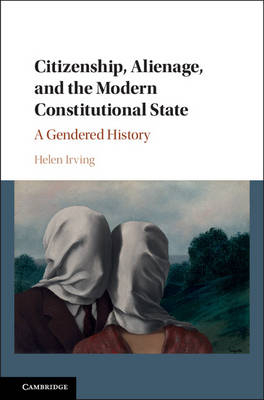
Citizenship, Alienage, and the Modern Constitutional State
A Gendered History
Seiten
2016
Cambridge University Press (Verlag)
978-1-107-06510-9 (ISBN)
Cambridge University Press (Verlag)
978-1-107-06510-9 (ISBN)
This book tells the long-overlooked history of women whose citizenship was stripped through marriage to foreign-born men in the nineteenth and twentieth centuries. Including numerous personal histories, it will be important reading for anyone interested in law, citizenship and gender studies.
To have a nationality is a human right. But between the nineteenth and mid-twentieth centuries, virtually every country in the world adopted laws that stripped citizenship from women who married foreign men. Despite the resulting hardships and even statelessness experienced by married women, it took until 1957 for the international community to condemn the practice, with the adoption of the United Nations Convention on the Nationality of Married Women. Citizenship, Alienage, and the Modern Constitutional State tells the important yet neglected story of marital denaturalization from a comparative perspective. Examining denaturalization laws and their impact on women around the world, with a focus on Australia, Britain, Canada, Ireland, New Zealand and the United States, it advances a concept of citizenship as profoundly personal and existential. In doing so, it sheds light on both a specific chapter of legal history and the theory of citizenship in general.
To have a nationality is a human right. But between the nineteenth and mid-twentieth centuries, virtually every country in the world adopted laws that stripped citizenship from women who married foreign men. Despite the resulting hardships and even statelessness experienced by married women, it took until 1957 for the international community to condemn the practice, with the adoption of the United Nations Convention on the Nationality of Married Women. Citizenship, Alienage, and the Modern Constitutional State tells the important yet neglected story of marital denaturalization from a comparative perspective. Examining denaturalization laws and their impact on women around the world, with a focus on Australia, Britain, Canada, Ireland, New Zealand and the United States, it advances a concept of citizenship as profoundly personal and existential. In doing so, it sheds light on both a specific chapter of legal history and the theory of citizenship in general.
Helen Irving is a Professor at the University of Sydney Faculty of Law and a Fellow of the Academy of Social Sciences in Australia, and of the Australian Academy of Law. She has published widely on constitutional law, history, citizenship, most recently with a particular focus on gender, and is the author of Gender and the Constitution (Cambridge, 2008).
Preface; Introduction; 1. The emergence of modern citizenship; 2. Naturalization; 3. The impact of marital denaturalization; 4. Marital citizenship and war; 5. Marital denaturalization begins to unravel; 6. The international response; 7. What is a citizen?; Bibliography.
| Erscheint lt. Verlag | 1.4.2016 |
|---|---|
| Verlagsort | Cambridge |
| Sprache | englisch |
| Maße | 152 x 229 mm |
| Gewicht | 580 g |
| Themenwelt | Geschichte ► Teilgebiete der Geschichte ► Militärgeschichte |
| Recht / Steuern ► EU / Internationales Recht | |
| Recht / Steuern ► Öffentliches Recht ► Besonderes Verwaltungsrecht | |
| Recht / Steuern ► Rechtsgeschichte | |
| Sozialwissenschaften ► Soziologie ► Gender Studies | |
| ISBN-10 | 1-107-06510-0 / 1107065100 |
| ISBN-13 | 978-1-107-06510-9 / 9781107065109 |
| Zustand | Neuware |
| Haben Sie eine Frage zum Produkt? |
Mehr entdecken
aus dem Bereich
aus dem Bereich
neueste Manipulationstechniken als Waffengattung der NATO
Buch | Softcover (2023)
Westend (Verlag)
24,00 €
Deutschlands Schwäche in der Zeitenwende
Buch | Softcover (2023)
C.H.Beck (Verlag)
18,00 €


